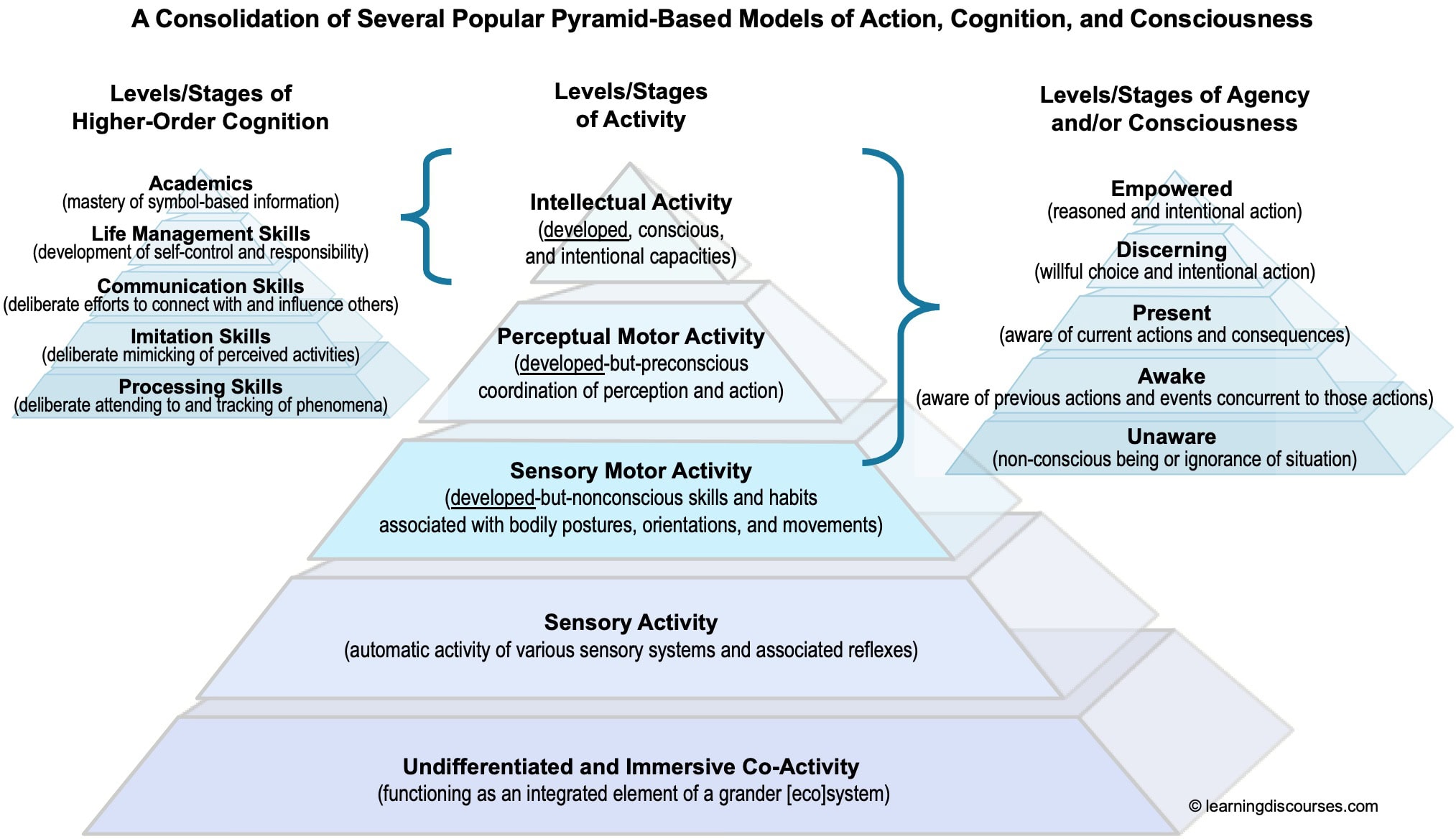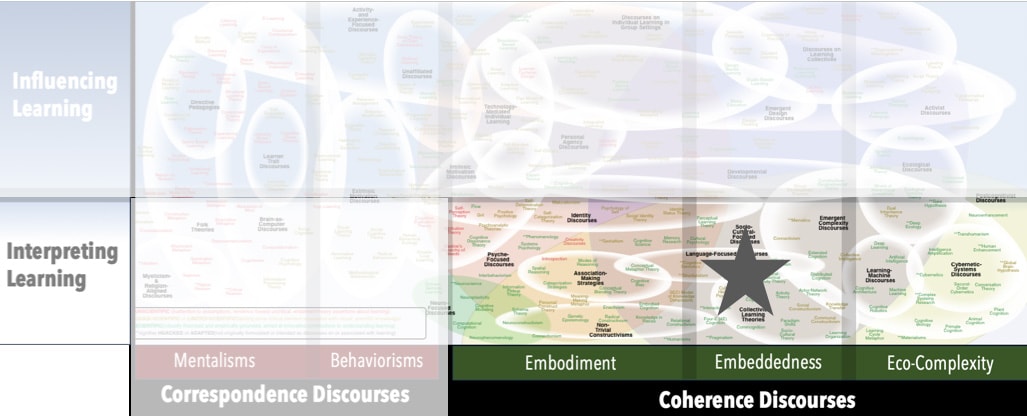AKA
Developmental Psychology
Lifespan Psychology
Stage Theories
Structural Stages Theories
Focus
Qualitative shifts in modes of cognitionPrincipal Metaphors
- Knowledge is … the range of developmental possibility
- Knowing is … stage-specific acting
- Learner is … a transforming individual (sometimes, an individual-in-context; rarely, a collective)
- Learning is … developing (often: movement along an anticipated trajectory)
- Teaching is … prompting, triggering, supporting
Originated
1940sSynopsis
Within Developmental Discourses, learning is understood as a recursively elaborative process rather than a linear accumulative one. Most Developmental Discourses focus on how learners’ key habits of perception and interpretation – that is, their strategies and preferences for construing and reconstruing their webs of understanding – change amid predictable sequences of biological, psychological, and emotional transformation. The basic idea dates back centuries, but it wasn’t until the 20th century until a range of empirically grounded theories emerged, reaching across matters of individual cognition and social engagement. Associated discourses and constructs include:- Child Development – the sequential behavioral, cognitive, and physiological changes of individuals from birth through adolescence
- Early Childhood Education (Early Years Education; Early Experience) – the Formal, Non-Formal, and Informal Learning (see In-/Non-Formal Learning) experiences of a child from birth to the start of schooling, at about age 5
- Growth – in principle, any sequence of changes that contributes to expanded psychological and/or physical possibilities for an agent. That said, among Developmental Discourses, “growth” is often (but not always) treated as a synonym for “development” – and, by consequence, it is often interpreted to stop when the agent reaches “maturity.”
- Hurried Child (Hurried Child Syndrome) (David Elkind, 1980s) – stress-linked behaviors arising from expecting too much of children too soon – often in the context of academic performance, but also in physical, social, and emotional matters
- Lifespan Development Theory (Paul Baltes, 1970s) – a perspective on human development as a lifelong process that’s marked by continuous growth and change from birth to old age. The theory emphasizes the dynamic interplay of biological, psychological, and social factors, framing development as multidimensional, multidirectional, and influenced by historical and cultural contexts.
- Maturational Lag – slowness in some aspect(s) of physical development (relative to agements), typically with consequences for cognition and behavior
- Multistage Theory – a descriptive category that includes any model or theory that is framed in terms of movement through or across multiple, well-defined levels or stages
- Parentification (Parent–Child Role Reversal) (Salvador Minuchin, 1960s) – when a child assumes the physical, emotion, and/or mental responsibilities of a parent for their sibling(s) and/or parent(s). Subcategories include:
- Emotional Parentification (Ivan Boszormenyi-Nagy, 1960s) – expecting a child to deal with issues that likely exceed their emotional maturity and/or a reversal of the roles of parent and child
- Instrumental Parentification (Ivan Boszormenyi-Nagy, 1960s) – assigning a child tasks and responsibilities that are not age-appropriate
- Pedology (various, 1920s) – a movement focused on the scientific study of child development. Strong emphases are place on testing ability and determining individual differences
- Personality Development – an umbrella term used to describe and collect discourses that address processes and consequences of self-creation, including tactics of distinguishing one’s self from others’ selves, sites of collective identifications, life-altering events, and ever-evolving contexts across the lifespan. Associated discourses include:
- Character Development – those aspects of Personality Development that have to do with the gradual emergence and evolution, over the lifespan, of morality, conscience, beliefs, values, and social attitudes
- Positive Adult Development (Michael Commons, 2000s) – a model of constructive and lifelong personal development in element that is structured around six processes: hierarchical complexity (i.e., sequenced levels), knowledge, experience, expertise, wisdom, spirituality
- Separation–Individuation (Margaret Schönberger Mahler, 1950s) – a developmental phase during infancy when one’s sense of a separate identity emerges, the most important elements of which is differentiation from the mother
- Psychonomics – the empiricist study (see Empiricism) of the mind, with particular emphasis on identifying laws that govern environmental influences on psychological development
 (For some specific pyramid-based models of learning, cognition, consciousness, and/or development, see, e.g., Learning Pyramid, Conscious Competence Model of Learning, DIKW Pyramid, and Maslow’s Hierarchy of Needs.)
(For some specific pyramid-based models of learning, cognition, consciousness, and/or development, see, e.g., Learning Pyramid, Conscious Competence Model of Learning, DIKW Pyramid, and Maslow’s Hierarchy of Needs.)
Commentary
Developmental Discourses were initially criticized for models of growth and change that seemed to offer universal developmental stages, failing to account for differences across cultures and settings. Current theories have responded with appropriate qualifications and elaborations. A second common criticism is that models of development are often interpreted in terms of ladders or lock-step linear trajectories. While some developmental theorists had that sort of imagery in mind, most envisioned something more like expanding spheres of possibility, with each new stage including but transcending prior stages.Subdiscourses:
- Character Development
- Child Development
- Early Childhood Education (Early Years Education; Early Experience)
- Emotional Parentification
- Growth
- Hurried Child (Hurried Child Syndrome)
- Instrumental Parentification
- Lifespan Development Theory
- Maturational Lag
- Multistage Theory
- Parentification (Parent–Child Role Reversal)
- Pedology
- Personality Development
- Positive Adult Development
- Psychonomics
- Pyramid Models of Action, Cognition, and Consciousness
- Separation–Individuation
Map Location

Please cite this article as:
Davis, B., & Francis, K. (2025). “Developmental Discourses” in Discourses on Learning in Education. https://learningdiscourses.com.
⇦ Back to Map
⇦ Back to List
